One of my favourite countries in Latin America, this Colombian slang guide will help you fit in.
Tomorrow is the last day of my two month visa in Colombia and I’m moving on.
When I first arrived in Colombia I was very frustrated because I could not understand Colombians. Colombian slang has its own set of expressions and slang.
Cuban Slang
Lunfardo: Argentinean Slang
Peruvian Slang
Ecuadorian Slang
I wasn’t sure if it was because they were mumbling, talking quickly or a combination of the two.
Colombia is a country with a large number of inhabitants and a variety of accents throughout.
This lends itself to many types of words being adapted nationally.
Below, are some of the most popular Colombian slang words, Colombian slang insults and Colombian slang greetings in general.
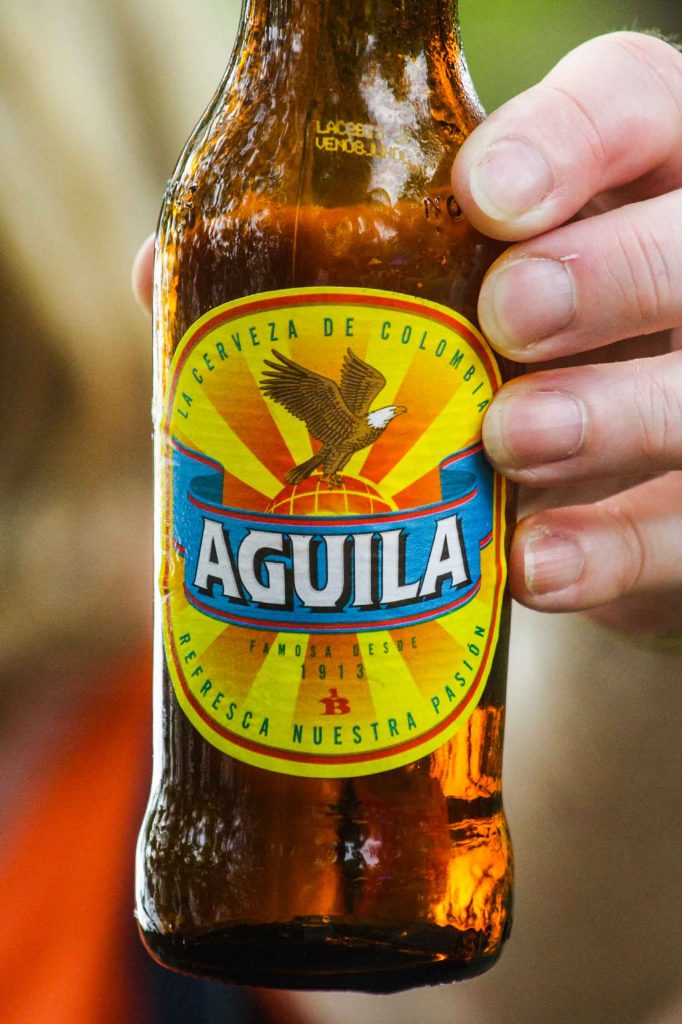
Essential Colombian Slang
One thing I did realize is that there is an incredible amount of expressions that I did not understand:
Listo
Listo literally means ‘ready’ but its also used if something is smart or cool or okay.
I hear this several times a day but when I first arrived I thought people were always asking me if I was ready.
Guayabo
With delicious aguardiente and other tasty Colombian drinks it is far too easy to become hungover.
In Mexico they call it crudo, which means raw. But the Colombian Spanish for hangover is guayabo.
Example: Este guayabo me va a matar…(EN) This hangover is going to kill me.
Man
That’s right, this English word is used a lot in Colombia and is used to refer to a man, a boy or a child.
Example: Este man es muy buena persona (This man is a very good person).
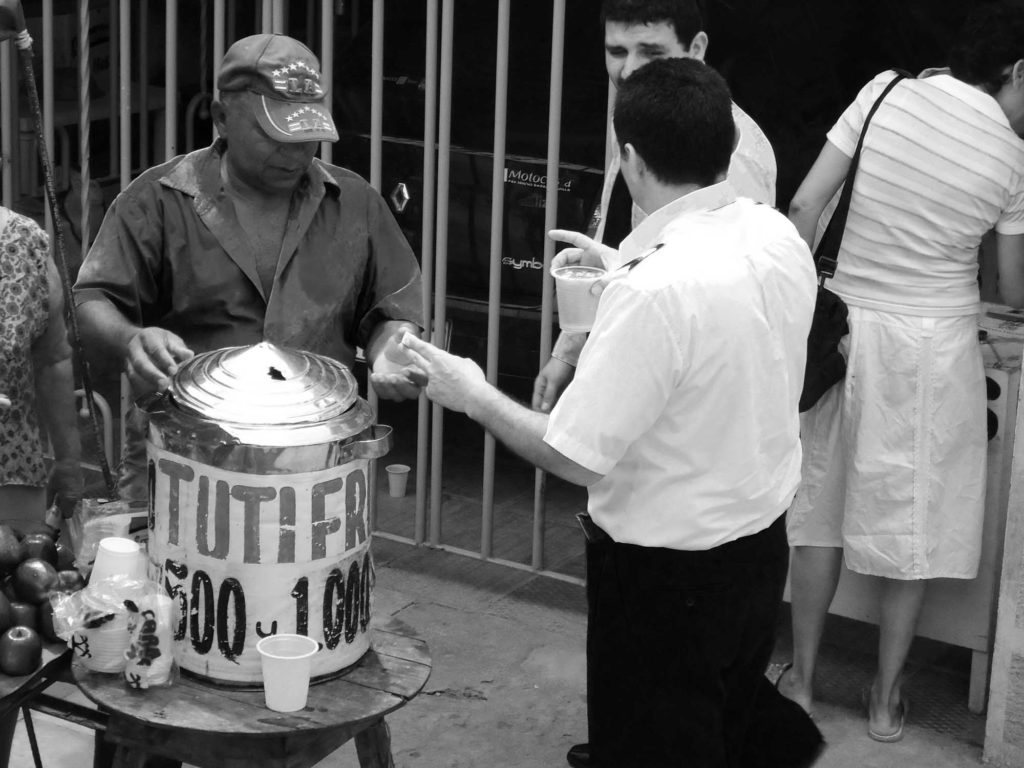
A la orden
Colombians are extremely polite and there is a sense of formality in their speech.
Anyone serving you, from a taxi driver to a grocery store clerk will say this to you. It literally means ‘to order’ but is more similar to ‘at your service’.
I did not understand this one at all, especially when I would complain to taxi drivers that they were charging me too much and they responded with this phrase which really meant get of the cab gringa.
Colombian Street Food
Amañado/Amañada
This is used a lot in Colombia and refers to when a person feels happy or comfortable in some place or situation.
Example: “Te veo muy amañado en la fiesta” o “te veo muy amañada en tu nueva casa” (EN) “I see you very happy at the party” or “I see you very happy in your new home”
Con mucho gusto
Another Colombian pleasantry which can be confusing. While in every other country it means ‘nice to meet you’ I started hearing it here from waitresses and other service people when I thanked them.
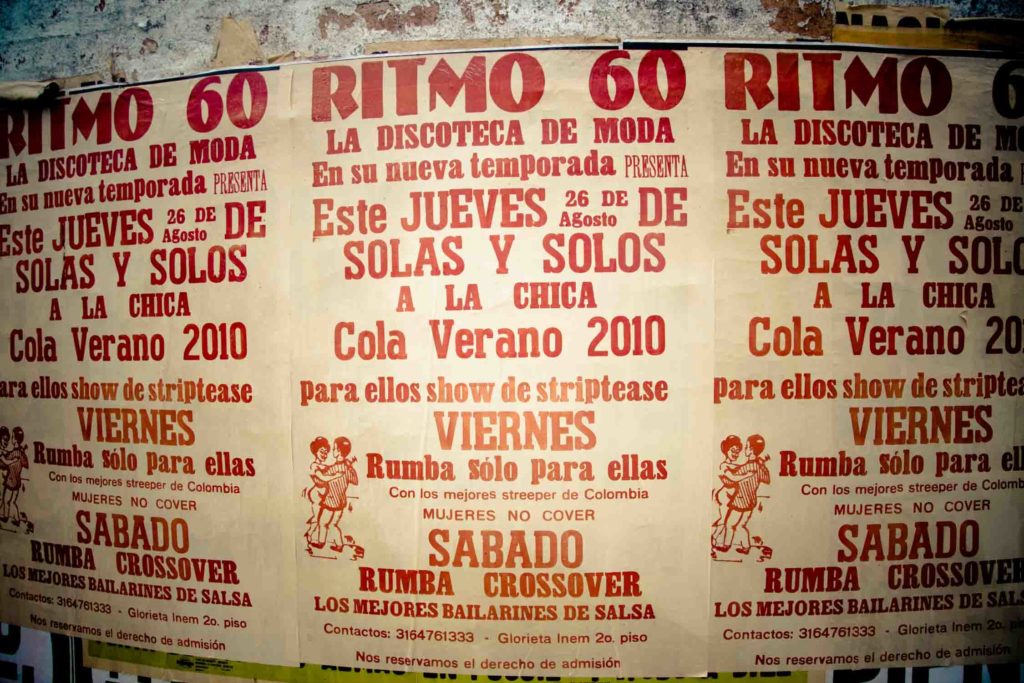
Caliente
Caliente does not only mean hot but it also means horny in Colombian slang. I learned this the hard way when my dance partner did not realize I was saying I was hot temperature wise.
Update: A kind friend just wrote me it was because I said estoy cliente and not tengo calor. Lesson learned.
Colombian Breakfast Foods
Hacer una vaca
Although this Colombian slang translates to make a cow. It is not quite far off.
The term “Hacer una vaca” or “Hagamos una vaca” refers to collecting money among several people for a specific purpose.
Colombians do it a lot to buy food, for vacations, for parties, for birthdays, etc.
Example: Hagamos una vaca para irnos de paseo el fin de semana. (En) Let’s pool our money together to go on vacation for the weekend.
Claro/cierto/dale
If you want to fit in you need to drop ‘si’ and start using local speak.
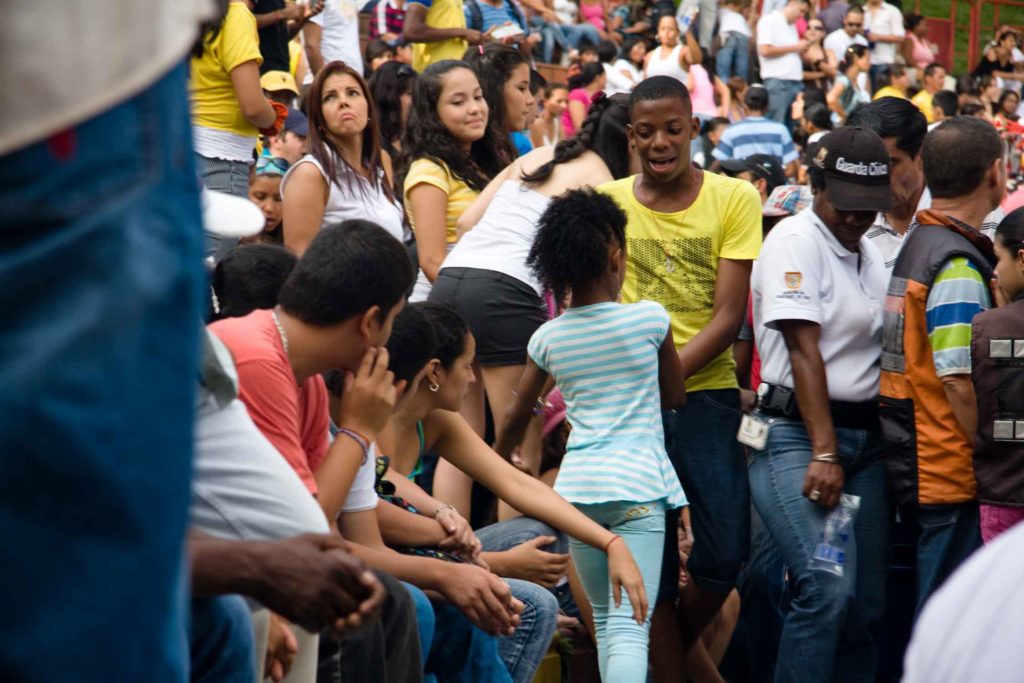
Lindo/linda
Colombians love to marvel at beauty and bonita, hermosa, guapa and preciosa weren’t cutting it; you’ll often hear them use lindo/linda to descibe pretty things.
Mono/Mona
This can also mean “Monkey” but in Colombia is used more “mico o simio” to refer to a monkey.
Mono is used a lot to refer to a blonde person (it is said with affection), so, if you are a foreigner and blonde, you will hear a lot that they call you “Mono” or “Mona” if you are a woman.
Example: You’re in a store and they say “Que se le ofrece mono” “What can I do for you, blondie?
Chevere/chimba/bacano
All ways to say something is cool although apparently chimba trumps chevre the same way awesome trumps cool.
But be careful because chimba also refers to female genitalia – although somewhat nice to see they at least appropriated it in a positive light.
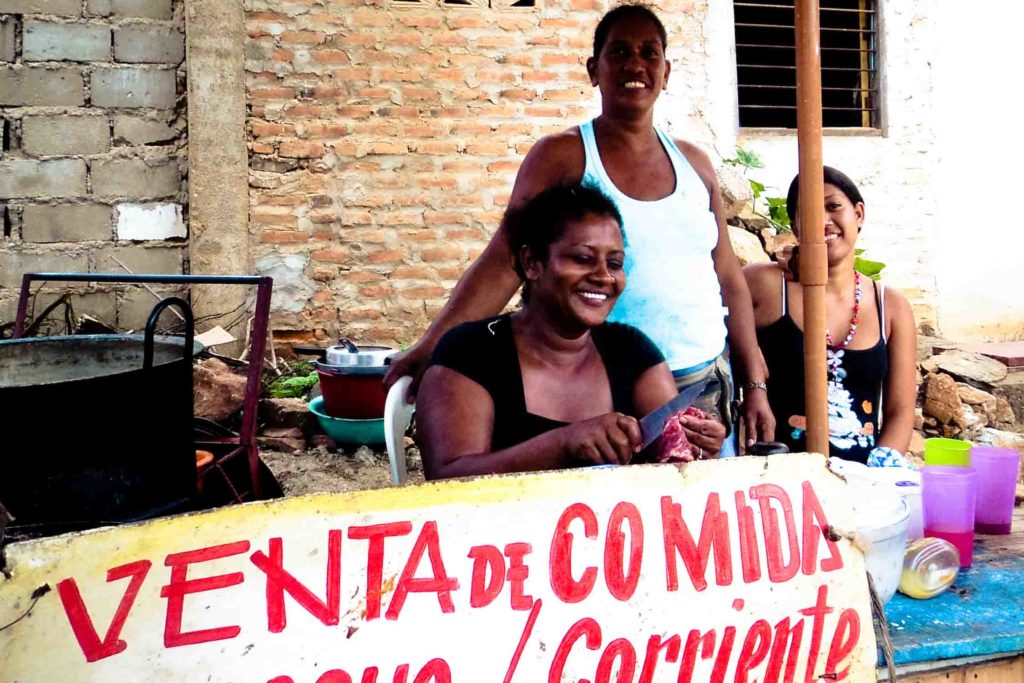
Parcero/Parcera
It is used to refer to someone who is a very good friend, who is like a brother and who is always in the good times and bad.
In Colombia friends also become part of the family, although in Colombia they are also very friendly and they use parcero to be more friendly and to enter in confidence.
Por’fa
Like our shortened expressions in English ‘por favor’ is too much for many Colombians so it’s become porva. This was the only slang that annoyed me as I could not find the verb in any dictionary.
Once I mastered these I really felt like I had taken my Spanish to a new level, of course that is today but tomorrow I’ll be in Ecuador and there may be a whole new batch of expressions to learn.
No Dar Papaya
While this literally means not to give papaya, this Colombian slang really means don’t put yourself in a vulnerable position.
Usually it’s advice to tourists in Colombia, not to walk around with their phone out or with jewelry. Don’t give someone a reason to rob you.
Vaina
This term can refer to an object, situation or action. For example: “¡Que problema con esa vaina!” or “Se dañó esa vaina…”.
The English translation is “What a problem with that thing!” or “That thing is damaged!…”
Qué pena
It is used a lot to ask for forgiveness or even to ask for permission to open a space for you while you pass through the crowd.
Example: you’re walking by and you bump into someone, you say, “Que pena amigo ¿te lastime?” (I’m sorry, did I hurt you?”) … or you need to pass through the crowd and say, “Que pena que pena” (Excuse me, excuse me) and they immediately know they must give you permission.
It’s such a common Colombian slang that J. Balvin and Maluma, both from Medellin, have the song Que Pena.
Vieja
It is another way of referring to a woman.
In Spanish it means that the woman is old, but in Colombia it is used to refer to a woman, even if she is young.
Example: Mira esta vieja tan buena…(EN) Look at this hot girl.
Hostigante
One of the best things about traveling in this country is trying the food, especially Colombian desserts.
Many of which can be very sweet, so they are said to be hostigantes.
Example: Ese arroz con leche es muy hostigante. (EN) That rice pudding is very sweet.
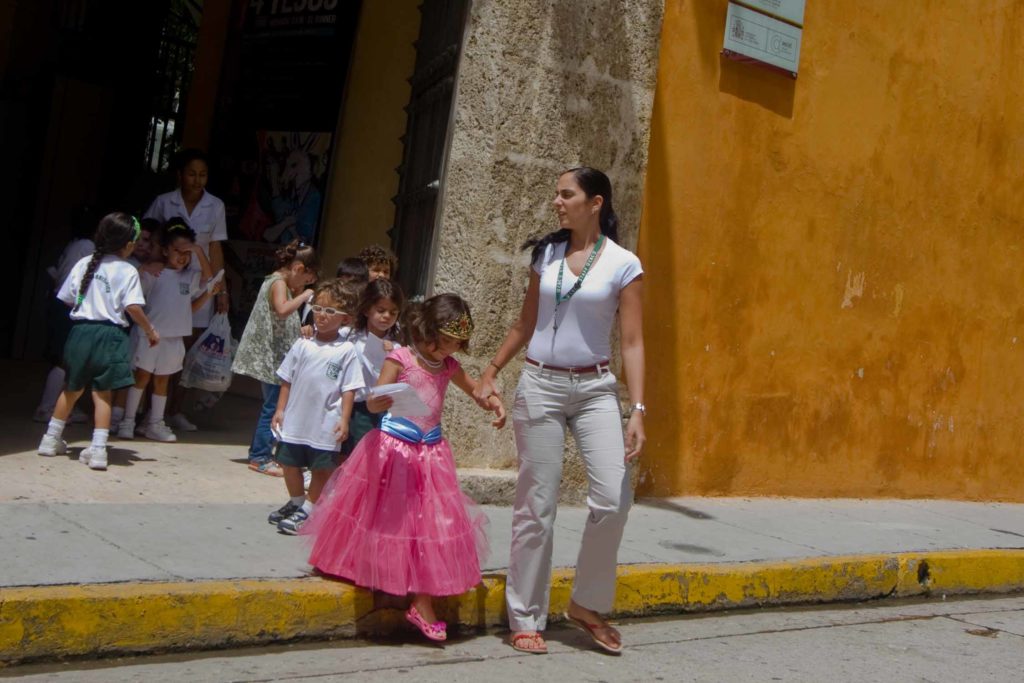
Chino/China
In Latin America Chino is often described for a person coming from China. But in Colombian slang children are called “Chino” or girls “China”.
Example: Ese chino se puso a llorar otra vez. (EN) That kid started crying again.
Camello
In Spanish it also normally refers to the animal you find in the desert with 2 humps.
In Colombia the word “Camello” is used to refer to work. Example: Al fin me salió camello enseñando inglés en una universidad. (EN) I finally got a job teaching English at a university.
And actually it means hump day, makes so much more sense with Colombian slang.
Intenso/Intensa
It is used against someone who is very tired or insistent.
Example: Este intenso no deja de llamarme. (EN) This annoying guy keeps calling me.
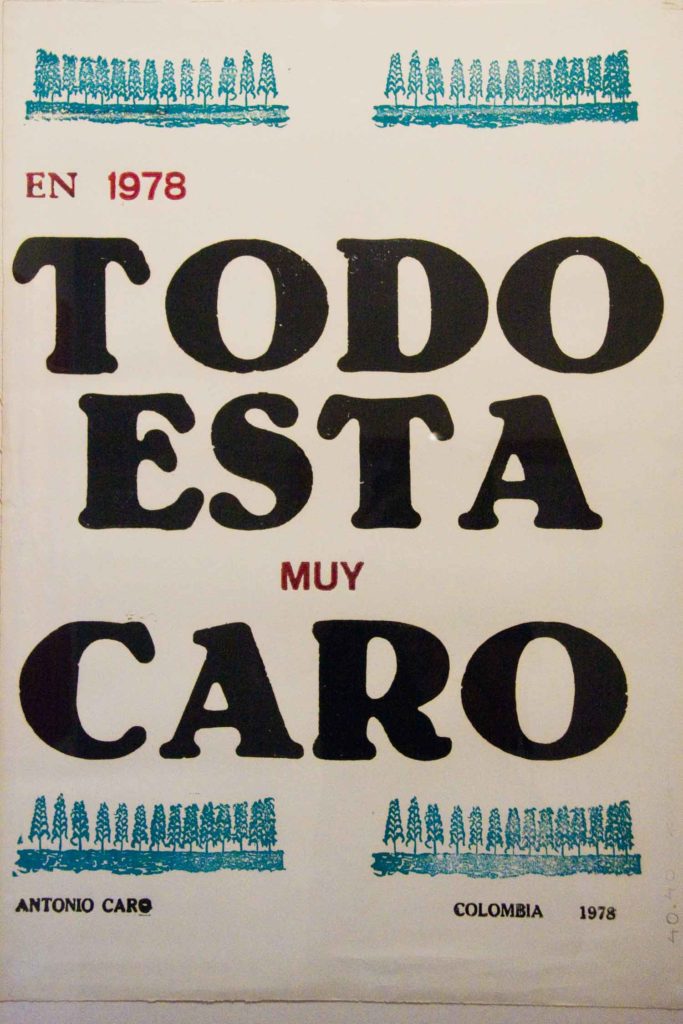
Colombian Spanish Words That Aren’t So Nice
You will hear these insults in Colombian jargon on some occasions and taking into account the place where you are.
You must take everything in context to understand when you are being insulted. Sometimes it may sound ugly, but may not entirely be an insult.
Hijueputa or Jueputa
This word is typical throughout Colombia, wherever you go you will hear this word a lot, as you often hear motherf*cker in English.
In Latin America, it is more common to hear hijo de puta, but in Colombia it is adapted as hijueputa or jueputa.
Many times it is used when something goes wrong, but it is also used when you fight or want to insult someone.
Example: Noooo “hijueputa” I forgot to pay the electric bill or “Este si es mucho hijueputa”.
Gonorrea
This Colombian slang is very common in Medellin. However, it is a Colombian word that is also used in the rest of Colombia.
Gonorrea is technically sexually transmitted infection. But in beloved Colombia it is used as an insult.
Example: Entonces que gonorrea…in many cases if you want to be much more rude, you can combine gonorrea with Hijueputa…Entonces que gonorrea hijueputa. (En) Something like, “So what, gonorrhea son of a b*tch.”
Huevon
This Spanish slang is found throughout Latin America, but the meaning varies from mild to a strong insult.
In Colombia it is someone who is too slow or too dumb.
Example: Este si es mucho huevon. (En) You’re very dumb.
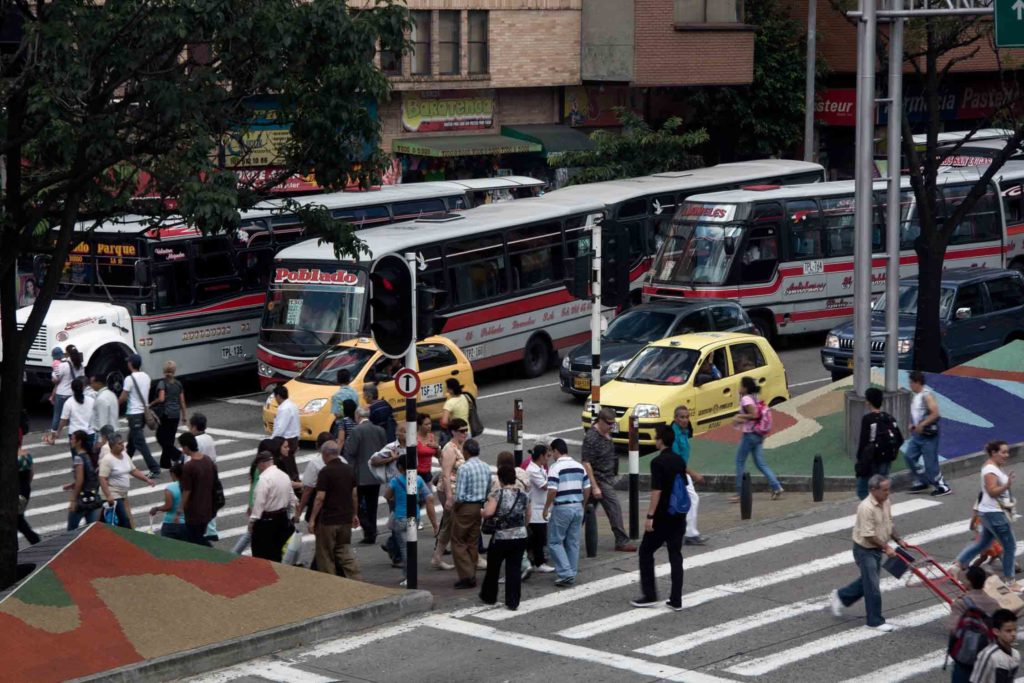
Ñero
It is a word that is said to someone who is badly dressed, badly spoken and looks disheveled, this word is the contraction of “Compañero”.
Example: Que man tan ñero…(EN) What a scruffy man.
Culear
It refers only to the act of having sex, in other countries it is used to follar, coger, etc.
In Colombia they use culear, although it is not very nice to say. Similar to f*ck, it’s good to know but perhaps use it only amongst friends.
Sapo/Sapa
Sapo is said to any meddlesome person.
It sounds pretty ugly when someone calls you “Sapo”, so you know that, if someone calls you a “Sapo”, they probably don’t want you there.
Example: Que man tan sapo…(En) How nosy you are.
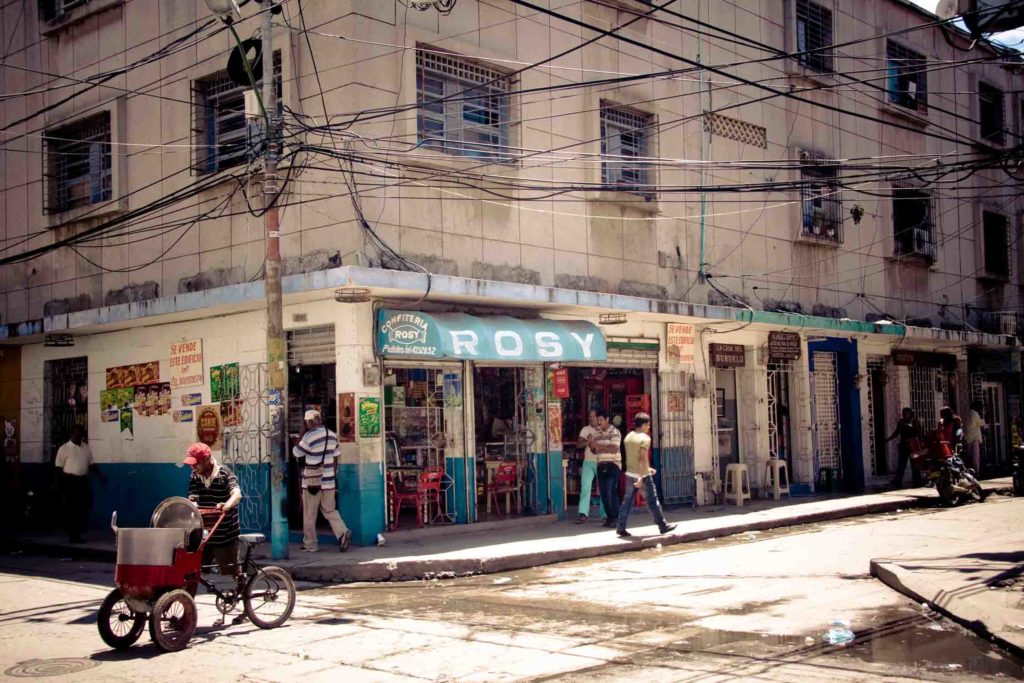
Qué maricada
It is used to refer to something ridiculous, stupid or not worthwhile.
For example: ¿Está llorando por eso? Qué maricada. (EN) Are you crying about it? That’s stupid.
Pichurria
A “Pichurria” is something that is not worthwhile, that is insignificant.
Example: Que regalo tan pichurria o que man tan pichurria. (En) What a boring gift or That man is a piece of shit.
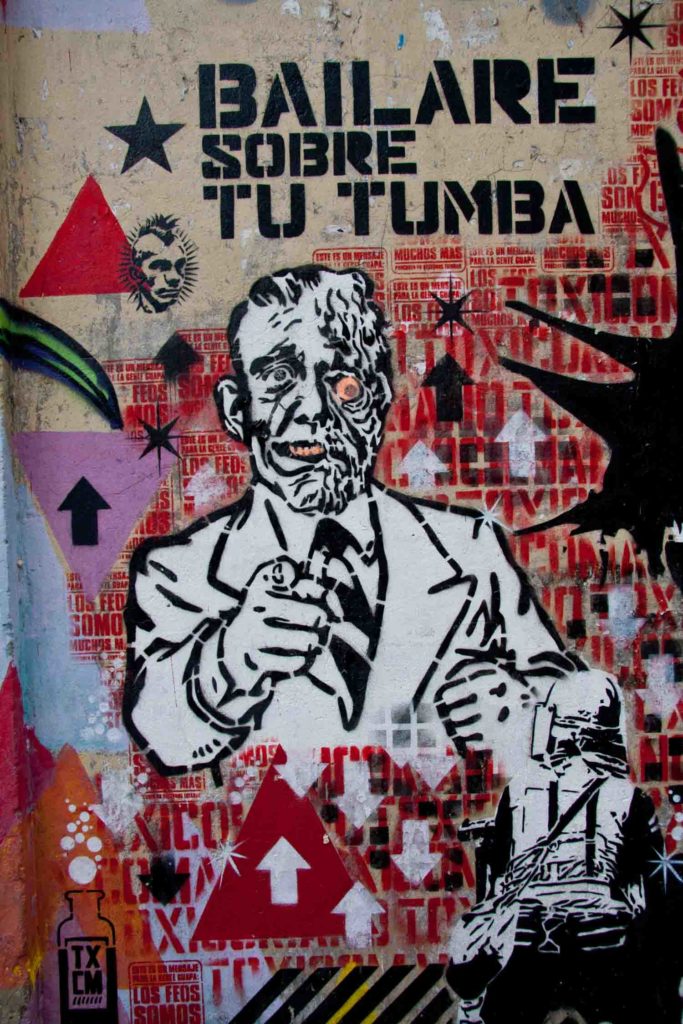
Colombian Slang Greetings
As a traveler I love surprising people by knowing the less formal ways to speak in Spanish.
So in Cuba, I say que bola? and in Mexico it is que pedo? instead of a more formal hola or cómo estás?
In Colombia there are several ways of greeting people that are somewhat different from other Spanish-speaking countries.
These are the Colombian Spanish greetings:
Quihubo
It is very common in Colombia, it is an informal form and it is used with people you already know or relatives.
Quihubo! It is an abbreviated and modified version of “Qué hubo”, which is used as a conversation starter. A
lthough when talking fast, it sounds more like a ¡Quihubo!
Qué más
¿Qué más? Which basically means “What else?”, many Colombians use this one to say “Hello, how are you?
You can use this greeting in a phone call, through WhatsApp or in person.
If you add “pues” at the end, like, ¿Qué más pues? You will sound quite paisa, that is someone of Medellin.
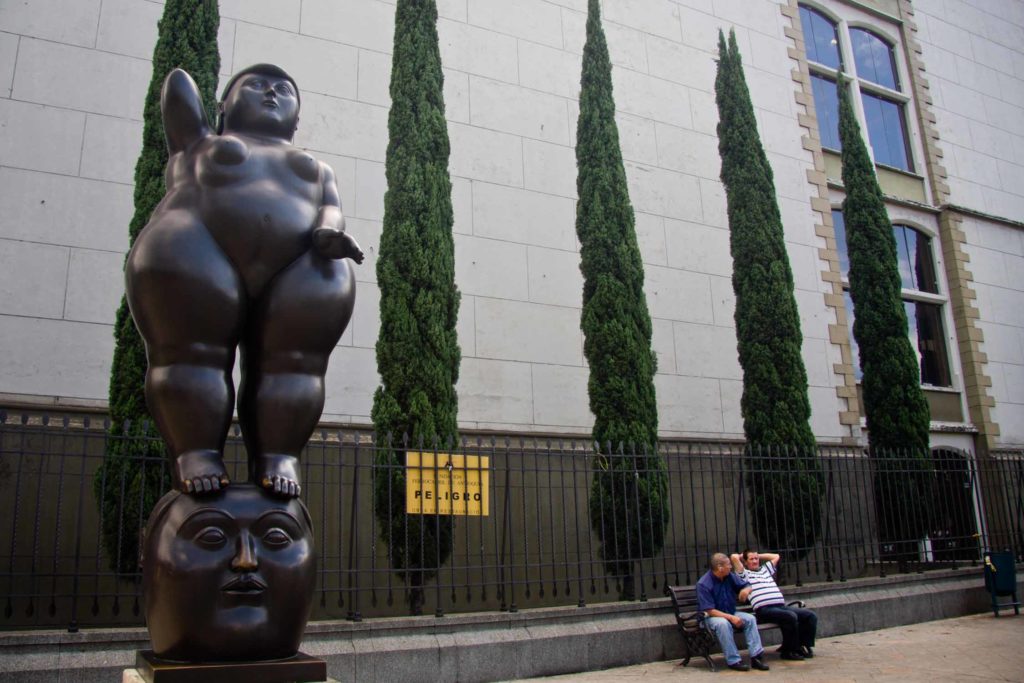
Buenas
“¡Buenas!” is the most common way of greeting when you arrive at a place in Colombia.
Buenas is an abbreviated version of Buenos dias/Buenas tardes/ Buenas noches, in Colombia you simply say “Buenas!”
It is valid for the day, the afternoon or the night. They will probably also answer back with a “Buenas!
Cómo van las cosas
This form of greeting literally means “How are things going”, it can be used through phone conversation, WhatsApp or in person.
It’s a good way to start a conversation because the same question invites you to tell several things about what has already happened.
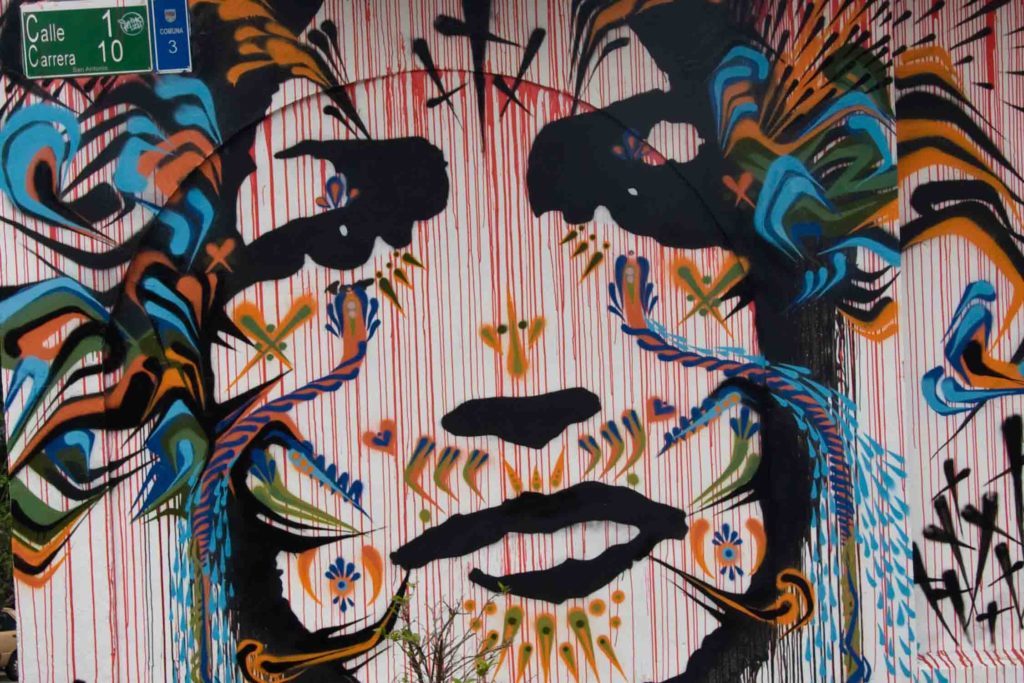
Colombian Compliments
Colombian men are people who don’t mind admiring a woman’s beauty and letting her know it very loudy.
Just as there are compliments that may not be as good, some of them make women smile, either because it is funny or because the woman is really flattered.
If you’re a woman traveling in Colombia it’s best to know what people are catcalling.
- De qué juguetería te escapaste muñeca? Which is translated into English as, “What toy did you run away from, doll?”.
- Qué hace una estrella volando tan bajito? Which translates to, “What is a star doing flying so low?”
- Quién fuera bizco para verte dos veces. Translated into English as “Who would be cross-eyed to see you twice”.
- Si eres casada, no te preocupes… No soy celoso! In English it would be something like, “If you’re married, don’t worry… I’m not jealous!”
I love this. Local slang is one of those things that seems nearly impossible to learn before spending time in the place. Thanks for the insider info.
Oooh I love learning slang on the road! My personal favorite to date is “budgie smugglers” (Speedos in Aussie). Although I speak Spanish, I’ve never heard a couple of those sayings and would like to implement “chimba!” (exclamation point imperative) into my everyday vocabulary–for the mere sound of it I might add, not it’s meaning! Almost sounds like you’re cutting gown a tree: “timber!”
If you’re going to use chimba just use it with closer friends, it cannot be really polite, i’m Colombian by the way.
Thank you for the tip!
I realized very quickly that Columbians do not use the diminutive as often as the folks in central america. Whenever I would say “ahorita” for ahora or “cervecita” for cerveza, they would just laugh at me and tell me that I spoke silly Mexican Spanish.
Colombians on the whole speak pretty clearly, albeit much faster than in central america. Once you get down to Chile and Argentina, it’s a whole new ballgame.
Sorry, that is incorrect.
I live in Colombia and hearing ‘-ita’ or ‘-ica’ at the end of a word is very common here.
Also, this guide of useful slang is really only useful for folks who literally speak little to no Spanish. Any Spanish speaker would easily understand these words.
There are many expressions that are unique to each Latin American country, and I encourage anyone traveling, or moving to a Spanish-speaking country to perform a quick google search to discover what they are.
Thanks for the clarification. This is indeed a guide for people who literally speak little to no Spanish as that’s what I learned during my time there.
Well I’m Colombian maried to a Central American
I think we did not use the diminutive as often as central american, and yes, if you use it too ofen, you will sound silly, oh yea you will. sorry.
I have lived in Bogota, Monteria and Ibague, and certainly in the Department of Tolima they use the diminutive a lot, sometimes it seems that almost every word in a sentence has ita or ito. Takes a moment to get used to it sometimes. My wife greets her (slim) friend with ‘hola gordita’, translated as ‘hello little fatty!’ Isn’t language fun!
The use of diminutive to communicate appreciation of something is a direct influence of Nahuatl, the language of the Mexica. This is why saying mamacita or cervecita are ways to show higher positive regard. Also, Mexico is not part of Central America as your post suggests.
You’re right it’s part of North America. Thank you for explaining the Nahuatl connection, it’s fascinating.
After this series, Columbia rose high on my “Places Next to Visit” list.
Thanks a bunch, Ayngelina!
-j
You spelled Colombia wrong
So where ya headed next?
Excellent! I’m going to Cartagena in January (although sadly only for a couple of days). This could come in handy 🙂
That is was is called paisa terminology. The coast line is a little more relaxed in their speaking. They will k ow right away you are trying too hard. Cartagena has several beautiful areas and several people speak English or understand it.
Once you know a bit of slang you feel you really belong.I’m looking forward to your next instalment about Ecuador slang.
Great tips as this is the most difficult thing about traveling in a country that doesn’t speak your native language. The basics simply don’t cut it. We had the same problem in Argentina after a few months in Peru and Ecuador. We thought we had a great grasp on the language, then we entered Argentina and thought they were speaking something completely different. It can be quite frustrating.
What a great, helpful post. Glad you’ve enjoyed your time in Colombia. Still our favorite country we’ve been.
i love it when colombians do it with gusto.
Just like the word “chino” around Bogota, the term “parcero” is exclusive to the region of Medellin and nearby areas.
I am sure we will be referencing this in future trips. We love to learn the slang, but should probably focus first on perfecting our basic spanish!
Good words there…
One of the funny things about Spanish is that every single country modifies it in a significant way. While I (native spanish speaker) can communicate fluently with any South and Central America spanish speaker, they all have different words for many things, or they switch words, meanings, and context.
For example, I know 8 ways to say “straw” in spanish (depending on the country), but each word means different things in every country… Talk about slangs!
Thanks for beating me to a post I’d been wanting to write for months! It’s amazing how once you learn these little slang words, how much you’ll use them, and understand what others are saying. It’s like putting grease in the gears of your (Colombian) Spanish skills.
I say “listo” and “chevere” like a champ now, but I still have trouble dropping “si” for “cierto” and “bonita” for “lindo.”
And I try not to throw around “chimba” too much for the reason you mentioned. My friend taught me the more vulgar “cara chimba” if you want to curse someone off!
I love learning slang! My favorite part about working in a restaurant was having all the cooks and dishwashers teach me Mexican slang. Thanks for the insider tips on Columbian slang!
Amazing how much local slang there is. In my German class we have quite a few Latinos from all over and often they don’t even understand each other with all the slang!
By the way, the word “chino/a is only used to refer to kids in or around Bogota and not anywhere else.
You probably learned Spanish from a Mexican teacher (like most people in the states), and that is why you could not understand Colombians. After reading some of your blog I realized that your previous idea about some of expressions was inaccurate. It’s true that Colombians use some of the expression in a particular way, but for example: “con mucho gusto” does not mean “nice to meet you”, that is just “mucho gusto”; instead, it means “my pleasure”….
It’s a subtle difference, and I can see why you were confused. Moreover, if you think Colombians are hard to understand, wait until you speak with Cubans or the people from the Caribbean….
@Camilo
I’m actually Canadian not American so my introduction to Spanish was in Central America, mostly Nicaragua.
But I agree there are many nuances, I was accustomed to using “mucho gusto” as an equivalent when English speakers say “nice to meet you” so the addition of “con” did not make sense to me at all.
Oddly enough while many people say Colombians speak the clearest Spanish, I find Ecuadorians much easier to understand.
This is a lot like Costa Rican slang and I’m still trying to get the hang of it! In my particular town, they are known for changing the slang language as soon as everyone figures out what it means. Right now, they are all saying “pescado”, which means fish, but they say it to mean “cool”, or “OK”. And since I know this, it will probably change to something else next week.
@Erin
That is funny, I like pescado for cool, doesn’t really work in English though.
nice post! got myself in trouble a couple of times going from country to country where words meant different things. my examples arent really fit for this forum though!
Language (or understanding it) is so much about the slang, eh? Where to now?
Por fa is my faaaaaaave! I say it all the time and annoy my fiance haha. I learned about “con mucho gusto” meaning something different when I was in Colombia as well. Another way to say you’re horney is estoy calenton/a.
Great post! I always catch myself using English slang on the road and realise that hardly anyone will know what I am going on about!
Where are you heading next?
I adore the way Colombians talk, they have the most lilting musical accent!
bahhaa, my ex boyfriend from colombia and I used to have some language barriers (especially when he used terms like those). For a good period of time when we first met he would say Linda and I would respond YOU KNOW MY NAME IS LINDSAY RIGHT!? haha… damn slang!
But at least I didn’t tell my dance partner I was horny!
OH SNAP! haha
You forgot Parce!! Oye parce! And “el fin”.
Ah I love to try and learn local languages, can’t say I’ve ever made it as far as learning the local slang though. That’s quite admirable lol
I’m surprised that Colombians use so many of the same terms as Chileans do! The only one I didn’t know was chimba. I’ve got a glossary of Chilean slang (chilenismos) on my blog if you’re interested!
Great info…fell into the ‘caliente’ trap myself a while back. Looking forward to starting Spanish lessons again. Thanks for the tips and inspiration.
@Sophie
Nice to hear I’m not the only one who is caliente 🙂
haha great stuff. Slang is always the quickest to pick up and learn
Hey there,
As someone struggling to learn Spanish, I am impressed by the ability to pick up the slang. Please keep me posted.
Be careful with chimba outside of Medellin. Otherwise, it means something completely different! 🙂
Brilliant! Estoy caliente made me laugh out loud and reminded me of Spanish lessons and the nuances between the language of Spain and South America – but too rude to mention in a comment 😛
Thanks for teaching us some slang. I like por’fa.
I was also surprised to realize how much Colombian’s use swear words in their everyday language use. And for food, “empanada” will save you lot’s of times as they can be found anywhere!
look up buzzinapps on itunes store, they have a free colombian slang app
Hey, its ColOmbian NOT Columbia, it pisses me off when ppl do that lol. They are totlly diffrent things!!
I think you are referring to the comments section. In North America we have British Columbia, Columbia University and a popular clothing brand called Columbia which is why it is natural for some of the commenters to make that mistake. But now I make the opposite mistake and call it British Colombia!
Lets just say that “con mucho gusto” means this: “with all my pleasure”
I am from Colombia, so I know what do you mean.
And I was in Canada last year
The interesting stuff is that in spanish “British Columbia” is “Colombia Británica”, But it is not official to refer to our country as Columbia in english. I said that because Canada translates the name like that in there official documenta on spanish
I can’t understand very well how to use the word in and on, because in spanish they mean the same: “en”
And how about “guevona”? Another Colombian slang word that means “lazy”
Hahaha guevon! Yes! But they also forgot “berraca” and “oyo?” “Baccan, berraca and chimba” all interchangeable ways to say something is the best or super cool.
“Oyo?” is their way of saying “You know, or understand?” at the end of a statement such as “We’ll meet at 7pm at the corner of Main and South street, oyo? “
Hehehe… Güevona/on it’s mostly something like Stupid, dumb. Malparida is more like ‘bitch’. Marica would be a pejorative term for a gay male, however between heterosexuals means buddy, friend… even between female close friends! For example: I can tell my best friend “marica, llego ese papasito de Julian” which means “dude, Julian my crush has just arrived” hehe. Chimba is my favorite! Especially when you are upset and you say NO, NI CHIMBA! That means NO, NO WAY! A Definite NO! It has many many meanings:
Que chimba! How cool 😎,
Que carro tan chimba! What an amazing car!
Catalina es una Chimba! Catalina is hot and beautiful
No me chimbee! Don’t bother me, leave me alone
La chimba! No, no way
Que cuento mas chimbo! When someone is telling you a story you can tell is bullshit
Que parche tan chimbo! When the hanging out with friends is boring
Que día tan chimbo! What an ugly day, difficult day
Chimb(a) feminine: positive, cool, pretty
Chimb(o) refers to something bad, not positive
I am from Medellín, Colombia 🙂
I’m proud to say I know all of these!!
Nice! I love learning slang in new places. I had such fun in Spain learning it!
I have spent alot of time in Colombia and for me it is a true Paradise. One slang she left out that puzzled me at 1st was “de pronto”, which oddly enough means, “maybe”. I love Medellin. Me encanta las Paisas.
I have found so many people go to Medellin and intend staying for a few days and then never leave!
Hi Ayngelina,
Just started following you. I love this post. I lived in Medellin, Colombia for 3 years. I am 1/2 Colombiana so all of this resonates with me. Love your writing style….and the name of your blog? Genius! Chao, linda. 😉
Aww thanks Christine, Colombia is a really special place.
It is such a great post! I would say main thing about Colombian slang is that it depends on which region you are visiting. For me it was quite imposible to understand people up north the “costenios” but people from Bogotá and Medellin were quite really cool to talk to. I’m so glad my 6 months stay in Colombia was a complete great experience.
Very true! I live in Barranquilla and the Spanish here on the coast is much harder for me to understand than in the interior! And just like everywhere – different regions equal different slang, so there is a lot of learning to do. You’ve got the big ones there though! Good list 🙂
What about “vacano”? I understand it means “cool!” I learned it from a Colombian friend and at least once in a Colombian film (can’t recall the film).
i live in colombia already long time
some more slang:
un tinto = black coffee
un perico means in bogota black coffee or in dancing a bag of dope
un pintadito = coffee again
llave = means friend or amigo in medellin
marca gato = cheap brand, fake etc…
mono = when girls talk about you, then this does means your cute and not a monkey
bizcocho = girls talk, this means your cute
q’hubo = when contesting phone colombians always say q’hubo que mas when its a friend similar to how are you or whats up
Thanks for the additions, I think a did hear llave while there but it confused me.
Mono or mona is slang for any white or blonde person, it doesn’t necessarily mean she thought you were cute.
The key to fitting in with the paisas is just saying pues every time you pause of think.
Some other more subtle:
Mija / mijo – as in ‘mi hijo’ or ‘mi hija’, it can be used in an endearing way or talking down to someone ‘ahy no mijo!’.
Bien o que? / vamos o que? – The spanish is Colombia is very direct, takes some getting used to. ‘Good or what?’ ‘Lets go or what?’.
Sizas – A way that often younger or poorer Colombians say yes. Doesn’t work on its own, but something like ‘sizas ome’.
Ome – I think its an abreviation of hombre, makes me feel like a mexican in a film when i drop that one in. ‘que mas ome?’
Polla – Means girl or chick in Colombia, don’t use it in Spain though as it means penis.
parce / parcero – amigo
Hijueputa – I love the paisa pronunciation of this word ‘eeh-weh-poota’. It means son of a bitch, but it can also be used as an exclamation point. ‘como un hijueputa’
chimba – chimba was mentioned, the easiest usage is ‘ahy que chimba parce’ or ‘(something) es una chimba’. Both meaning something is good, although chimba can also mean something is bad.
gordo/gorda (fatty), flaco/flaca (skinny), mono/mona (whitey), negro/negra (black person)- These are not really slang, but be prepared to be called these sort of things in Colombia. Colombians are refreshingly direct, but it takes some adjusting to. For example, a girl can walk into a shop and the woman behind the desk might say ‘gorda, a la orden’ (literally – fatty, at your service).
Grilla (pronounced greejah) – a word used in medellin to describe women who liked to drink and party. Like a ‘rumbera’ but with less clase. Women use it as a negative but men are obviously sometimes attracted by the idea. Itagui has been referred to as grillas paradise, but I couldn’t possibly comment.
I can’t think of any more off the top of my head, but men who don’t like to spend money can be referred to as having chicken-arms (ie, they don’t reach their pockets) and the gesture for this is rubbing your elbow.
Also, Colombians sometimes point with their lips. Its a skill I haven’t mastered.
Ah, another one I like.
la caliente-huevos / la calentadora (the egg warmer or just the warmer) – this is a phrase used to describe sexy or flirty girls who show interest but don’t want to have sex.
Another vulgar one is ‘quatero’, which is used by some as ‘wingman’. Use your imagination as to why. This should be used with caution as it is rather an indelicate term.
Arepa is both a delicious food and can also be used as a slang for lady parts. ‘Te gusta arepa paisa?’
Thanks so much Simon, these are really great additions.
Parce, buen trabajo! Perfecto!
Catalina
Con mucho gusto means “my pleasure” or “it was my pleasure” !
Hullo! I’m new to your site and had to check out the Colombia section since my novio is Colombian. He taught me a few of these phrases after I was CLUELESS about what his visiting friends were saying!
I learned several new phrases with your post–I’d never heard “a la orden” or “chimba.” Gracias por una clase tan bacana!
Con mucho gusto
with much pleasure – that they enjoyed helping you
mucho gusto
much pleasure – that they enjoyed meeting you
Its funny what happens to Canadians, specially west Canadians, with Colombian Spanish. While for many Americans, British and overall Europeans find very clear Colombian Spanish, Canadians always say we are rumbling words and that they prefere Costa Rica´s or Nicaragua´s Spanish. As a matter of truth for me as Colombian it is almost impossible to tell the diference between people of tis three countries.
I am British ad married to a Colombian who is from Medellin-I was there recently and was kept bieng told “tranquila” or tranques which means Don’t Worry,
Yes I heard that a lot as well, guess we are worked up even by Colombian standards.
This is a great post, highlighting some of the best ways to learn slang! Linguist Kato Lomb said that the main thing that holds people back is fear – like a denominator dividing your skill, and I got that sense from your point on body language. Confidence is everything!
Great post, Colombia and Perú(where I am from) are very similar countries and we have pretty much the same slang, but, some of it, has different meaning (don´t ask me why). For example in Peru chimba means cabeza. And we say bacan instead of bacano. We also use a lot of -azo like bacanazo (very cool), o buenazo (very good)and we use a lot the word “pues”, si pues, no pues, claro pues… etc…
As a fellow native Colombian I just wanted to mention that although direct, the term Gordita (fatty girl, term of endearment) is actually good, as Colombians prefer women with curves, and the term Flaca (skinny girl, endearment term) is usually not so good. In Calli, we also always use oye, mire, vea as a way of starting conversation and getting your attention on a topic or on something. Berraca can also be used to describe a badass (cool) hard working woman who gets what she wants (fierce) ie. Ella es UNA berraca. but when you make the word an adj. example Ella ESTA berraca, it means she’s mad.
Thanks so much for the additional terms, I’ll need them the next time I’m in Colombia.
I’ve been in Colombia for the past month and am loving re-learning the slang! Really cool article!
Están mamando gallo
That is a funny one!
Take a look at this great tutorial about swear words:
I love to see you gringos so into our Colobian slang. ? It comes so naturally for me, I did not even realize how confusing some of our slang could be to a non native.
Following from Simon’s comments above, here’s a few more slang terms that Colombians use for dating, in case it’s of interest to your readers. Many thanks!
Great resource, thank you!
Que chimba de blog!
What a great blog!
But if you change for “chimbo” and place it at the end it means that is a really bad post lol.
But sereously, nice blog Ayngelina. You can learn de deepest roots of a culture knowing how it comunícate.
I am from Bogotá and we use to finish the words with the diminutive ito ita Hahaha.
“Pelao” referring a young boy or being with no Money.
And some times using “marica” or “güevon” In every phrase; although they are bad words, we dont feel the intention.
Chao parcera.
Thank you so much! Do you have any other words we should add?
Off topic, sorry. In Spanish (Colombian), for a woman/girl named Patricia, is it correct to use the nick name “Patico?” Ending in an “O”, wound that be masculine? How about “Patrick”? Besides being very Anglo, seems very male. Is “Patrick” chimba?
I asked a friend about this for you as I would think it should end in A not O. He said that no one shortens Patricio, which is why patico only refers to a woman. But pato and patica are also used – again only in Colombia. And in other Spanish speaking countries in South America it’s common for it to be shortened to Patti.
Patico is OK and it’s cute. It’s a lovely way to call a Patricia you love :). We have a cousin Patricia we call Pato (duck) or Patico (patico is a small cute duck)
OK, THX. But how about the “Patrick” thing? BTW, you look muy linda.
Patrick is only shortened to Pato in Colombia, which means duck.
Ooooooooooook…THX…but I know a Colombian girl named Patricia, who insists her nickname is Patrick. What’s up with this? Is she being hyper Anglophile? I need to know. I don’t want to encourage that—seems same as blond hair fetish on Univision/Telemundo. Also, I cringe at calling such a feminine woman, “Patrick!” OMG! BTW, “Pato” sounds a lot like “Bato” which also means duck, but also “faggot.”
Your friend is confused… there is no Patrick in Colombia for a female… or perhaps she is the only one in the entire country. We have Patricio (male and rare) or Patricia (very common). Patricias are called Pato 🦆 or Patico
Con mucho gusto mean’s with pleasure, I think you got this confused with mucho gusto which means nice to meet you.
So it’s like saying “Thanks very much”
“My pleasure”
I see your confusion with some of these words when you were here. Think of ‘a la orden’ – More like the English ‘at your service’ then it makes alot of sense. Time to get back to Colombia!
Hi. I wouldn’t recommend using this word. It’s just vulgar and completely unnecessary.
As a colombian, I do use it sometimes, but I’m fully aware of how vulgar it makes me sound.
Which word?
I speak Spanish in an intermediate level
Of I want to use the word “carino” to my wife would I say “Carina”?
Yes its subject to masculine and feminine use so cariño and cariña.
Cariño is gender neutral. You call your boyfriend or girlfriend cariño. Cariña does not exist.
Thanks so much for this. Im in Colombia a lot and these types explanations really help cement what I think I’ve heard, what I think it meant and keep my ear trained on what to listen for. This is invaluable. Thanks again foe putting this together!
I am from Miami and when I travel to Colombia I am asked if I am costeño, as the the accent in the coast is similar to Caribbean accent. I find vey useful to watch the Colombian series/telenovelas in Netflix. You can hear most slangs there, particularly paisa. I think you missed “culicagao” (young inexperienced): caraechimba (insult); pelada (girl): Berraquera (awesome): Rolo ( from Bogota): rumba (partying); guaro (aguardiente); prepago (escort/prostitute). Best equivalent of parcero in urban US would be”bro”. Pls. Feel free to correct me as needed.
I think is very cool that Colombia is getting such a big hype nowdays. Colombian spanish is one of my favorite variations of the language, and is incredibly complex – it goes beyond slang words and their meaning, they must be used in the correct context. I’m Venezuelan, but my girlfriend is paisa – and I’ll throw a few more words/expressions to impress your colombian friends. These are a bit too advanced maybe, but as a native spanish speaker they were the ones that caught my interest the most when I heard them the first time (and I’ve fully integrated into my paisa maracucho spanish):
– Arrecho/arrecharse: to get mad or get horny, depending on the context.
– Guaro: nickname for aguardiente. Is like the colombian tequila.
– Oe: is like “yo” in the US. As in “Oe! pasa el guaro ome!”
– Comerse a una mujer/vieja: literally to “eat woman/girl”, is a cooler/nicer way to refer to sex.
– Pirobo/a: is big insult, kinda like “a**hole” for americans.
– Entre menos sepa mas vive: my favorite colombian expression, literally “the least know know, the longer you live”, makes me feel I’m on a drug tv show lol.
– Empelicularse: to “get into a movie”, means to get crazy ideas in your head.
– Colabore: means “to collaborate”, you can say this to ask for help to someone like “colaborame por’fa”.
– parche/parchar: cool way to say hang out with friends.
– de una: means “right away”, but you can use it when someone invites you somewhere or to hang out, you can say “de una”.
– marica: means gay, depending on the context can be an insult or a friendly “dude”, as in “claro marica!”
PS: try avoid mispelling Colombia with a “u”, colombians really hate it for whatever reason. And don’t wear sandals on the streets when you visit any latin american country, is not only unsanitary and tasteless, but latin americans will think very little of you. Enjoy!
Excellent survival guide for Colombian Spanish.
I too had many problems when I arrived. Listo y que más.. jajaja it’s funny now that I have some slang but your list is exhaustive.
Thanks for sharing so many words. My Colombian friends tell me that I am half paisa now
It is used in Ibague a LOT